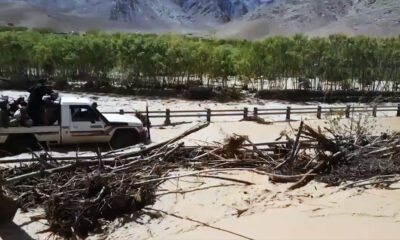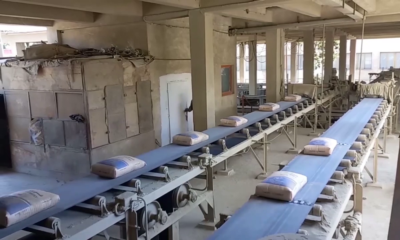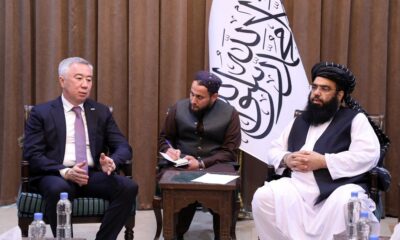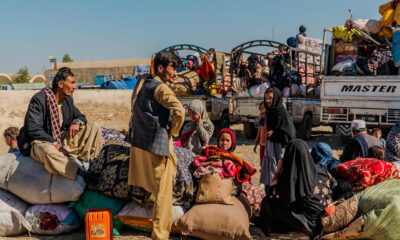Latest News
Israeli police attack worshippers in Jerusalem’s Al Aqsa, Gaza launches rockets at Israel
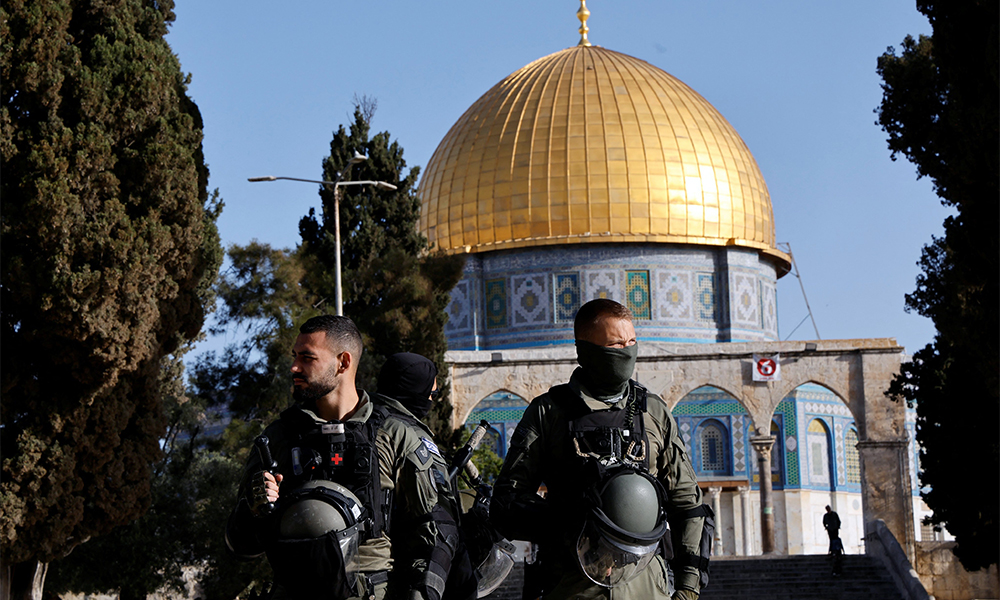
Israeli police entered Jerusalem’s Al-Aqsa mosque before dawn on Wednesday and clashed with worshippers, setting off a furious reaction from Palestinians across the occupied West Bank and crossborder strikes in Gaza, Reuters reported.
The incident, during the Muslim holy month of Ramadan and on the eve of the Jewish Passover, came amid fears that tensions built up during a year of escalating violence could be unleashed at the Al-Aqsa mosque, where clashes in 2021 set off a 10-day war with Gaza.
At least nine rockets were fired from Gaza overnight, prompting air strikes from Israel which struck what it said were Hamas weapon production sites, setting off ground-shaking explosions heard across the blockaded coastal strip.
Witnesses said Israeli tanks also shelled Hamas positions along the border fence in the southern part of the Gaza strip.
As day broke, the situation appeared to have calmed but the Palestinian Red Crescent said 12 Palestinians had sustained wounds, including from rubber-tipped bullets and beatings, in clashes with Israeli police. It added that Israeli forces were preventing its medics from reaching the area, read the report.
“In the yard to the eastern part of the compound, the police fired tear gas and stun grenades, it was a scene that I can’t describe,” said Fahmi Abbas, a worshipper at the mosque. “Then they stormed in and started beating everyone. They detained people and put the young men face down on the ground while they continued beating them.”
Videos circulating on social media, which Reuters could not independently verify, showed fireworks going off and police beating people inside one of the mosque buildings. Police video showed police entering the building while fire crackers exploded in the darkness, Reuters reported.
Israeli police said in a statement that security units were forced to enter the compound after what it called masked agitators locked themselves inside the mosque with fireworks, sticks and stones.
“Following many continuous attempts to remove the individuals from the mosque using dialogue failed, police were forced to enter the compound in order to remove the individuals,” the police said.
“Throughout the presence of police forces in the compound, stones were thrown and multiple firecrackers were set off inside the mosque by many law-breaking individuals and rioters,” the police statement said, adding that two police officers were wounded.
It said police arrested and removed more than 350 people who had barricaded themselves inside. “The police did a good job,” the hardline National Security Minister Itamar Ben-Gvir said in a statement.
Thousands of worshippers spent the night in the mosque compound, amid fears of possible clashes with Jewish visitors to the site, which they revere as the Temple Mount, the site of Judaism’s two ancient Temples.
Under the longstanding “status quo” arrangement governing the area, which Israel says it maintains, non-Muslims can visit but only Muslims are allowed to worship in the mosque compound. Jewish visitors have increasingly prayed more or less openly at the site in defiance of the rules.
The Waqf, the Jordanian-appointed organisation that manages the complex, considered the third holiest site in the Muslim world, described the police actions as a “flagrant assault on the identity and the function of the mosque as a place of worship for Muslims alone”.
The incident drew a sharp reaction from Arab countries. Jordan and Egypt, both involved in recent U.S.-backed efforts to de-escalate tensions between Israel and the Palestinians, issued separate statements strongly condemning the incident, while Saudi Arabia, with whom Israel hopes to normalise ties, said Israel’s “storming” of Al-Aqsa undermined peace efforts, Reuters reported.
Hazem Qassem, a spokesperson for Hamas, the Islamist group that controls Gaza, said the overnight rocket fire was a response to the police raid in the Al-Aqsa mosque and showed Israel would not be able to separate Gaza from the West Bank.
“The Zionist bombardment on Gaza was a failed attempt to prevent Gaza from continuing its support to our people in Jerusalem and the West Bank by all means,” Qassem said.
However neither Hamas, nor the Iranian-backed Islamic Jihad movement, claimed responsibility for the attacks, which were instead claimed by the smaller Democratic Front for the Liberation of Palestine and the Popular Resistance Committee. The Israeli military says it holds Hamas responsible for all attacks from Gaza.
The Palestinian Authority leadership condemned what it called Israel’s attacks on worshippers, which it described as a crime, read the report.
“We warn the occupation against crossing red lines at holy sites, which will lead to a big explosion,” said Nabil Abu Rudeineh, spokesperson for Palestinian President Mahmoud Abbas.
In the West Bank town of Beit Ummar, protestors burned tyres and threw rocks and explosive devices at Israeli soldiers, one of whom was shot and wounded.
With Israel still reeling from weeks of domestic tension over Prime Minister Benjamin Netanyahu’s bitterly contested plans to rein in the powers of the Supreme Court, the incident added to an already fevered political atmosphere, read the report.
Over the past year, Israeli forces have made thousands of arrests in the West Bank and killed more than 250 Palestinians, while more than 40 Israelis and three Ukrainians have died in Palestinian attacks.
Israel captured East Jerusalem, including the Old City where the Al-Aqsa Mosque compound is located, in a 1967 war and later annexed it in a move not recognised internationally. It regards Jerusalem as its eternal and indivisible capital, Reuters reported.
Palestinians want East Jerusalem for the capital of an independent state they seek in the West Bank and Gaza.
Latest News
Eight dead in rain across Afghanistan over past four days

Mullah Janan Saiq, the spokesperson of the Ministry of Natural Disasters, says that eight people have died, three people have been injured and 20 hectares of agricultural land have been destroyed as a result of the rains and floods in the past four days.
Saiq also said that as a result of the recent rains in the country, 140 houses were damaged or destroyed and 20 kilometers of roads were also destroyed across the country.
According to him, 30 cows were also lost.
“Fortunately, as a result of the recent rains, the water level in the country has increased, the underground water has been strengthened and the farmers are happy,”
he said.
According to him, the Ministry of Natural Disasters has directed its directorates in the provinces to use all their facilities to help the victims.
Latest News
Ghori State Cement in Baghlan increases production
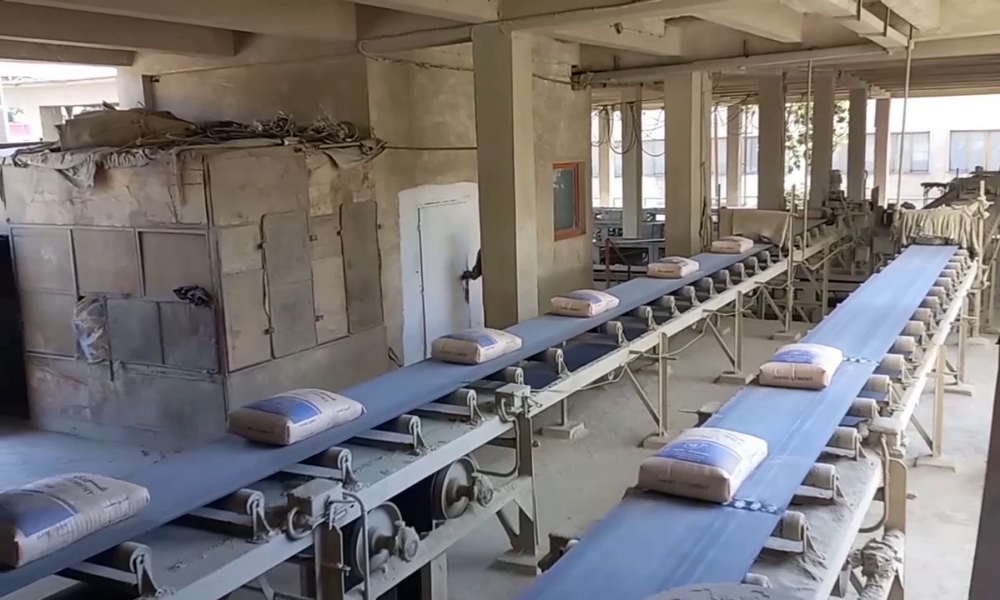
Officials at Ghori State Cement in Baghlan province say the amount of cement produced at this plant has increased compared to the past.
According to company officials, 150,000 tons of cement was produced in 1402 [solar year] and they are trying to increase the amount to 180,000 tons this year.
“Last year, we successfully produced 150,000 tons of cement and sold it to the market. Fortunately, in 1402, we had more than 200 million afghanis in revenue,” said Abdul Wakil Qayumi, financial and administrative deputy of the company.
The plant officials stated that efforts are underway to increase the production capacity, and with the increase of the production capacity, they will produce 1000 bags of cement per day.
“Currently, our four ovens are active, and we produce approximately 1,000 to 1,200 tons of cement in twenty-four hours,” said Mohammad Tahir, packaging manager for the company.
In this company, jobs are created for 750 individuals, and some workers have asked the traders to invest in the country and provide work for young people.
“Some more factories should be built in our country so that less foreign cement is imported into the country and we use our own products,” said one of the company workers.
Ghori Baghlan Cement Company was established about 40 years ago and is considered one of the largest cement production companies in Afghanistan.
The management of this company is carried out by the National Development Corporation (NDC).
Latest News
Regional countries should jointly expand stability and development: Deputy PM
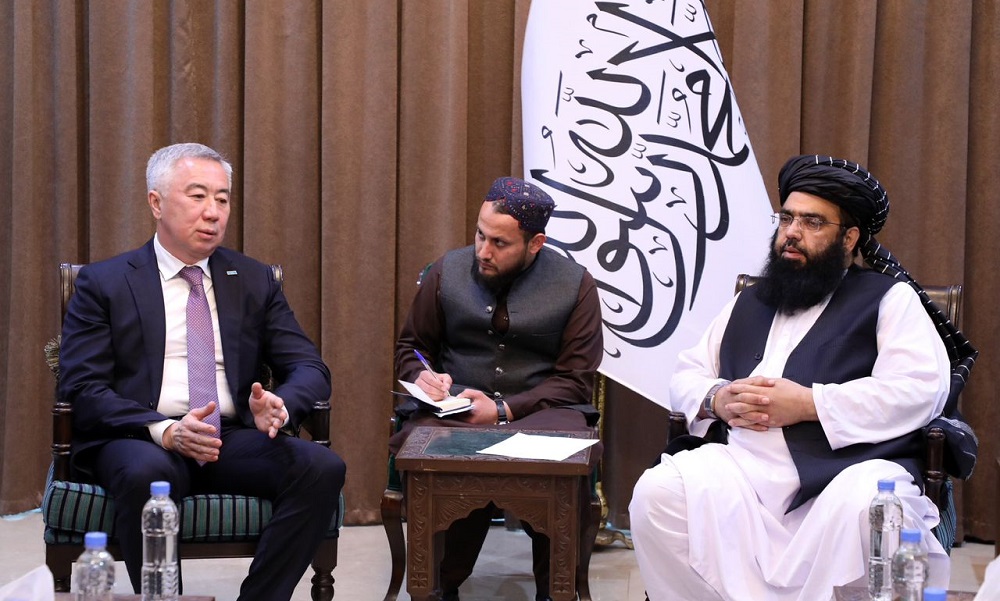
Mawlawi Abdul Kabir, Political Deputy Prime Minister, has said in a meeting with the Deputy Prime Minister of Kazakhstan in Kabul that regional countries should play their role in the implementation of large regional projects.
Kabir also invited Kazakh businessmen to invest in Afghanistan, his office said in a statement.
He added that the Islamic Emirate fully controls Afghanistan’s borders, has eliminated drugs and corruption, and restored national sovereignty.
According to the statement, Deputy Prime Minister of Kazakhstan Serik Zhumangarin appreciated the progress made by the Islamic Emirate in Afghanistan and said that his country is ready for long-term trade, transit and investment relations with Afghanistan.
Zhumangarin expressed his country’s readiness to grant scholarships to Afghan youth and added that Afghanistan is currently an example of a peaceful country in the region, and due to this, the world wants to establish relations with the Islamic Emirate in various fields.
He also called for the start of direct flights between Kabul and Almaty and said that his country is ready for bilateral cooperation with the Afghan government in the cultural field.
-

 Latest News5 days ago
Latest News5 days agoOver 1,000 Afghan refugees forced out of Pakistan in one day
-

 Sport3 days ago
Sport3 days agoAfghanistan beat Iraq 5-3, inch closer to Futsal World Cup berth
-

 Regional3 days ago
Regional3 days agoNew UK sanctions target Iranian drone industry
-

 Regional4 days ago
Regional4 days agoTurkey accuses U.S. of double standards over Gaza in rights report
-

 Latest News3 days ago
Latest News3 days agoEU allocates 17 million euros to support Afghans on the move
-

 Latest News2 days ago
Latest News2 days agoPakistan extends registered Afghan refugees’ stay till June 30
-

 World4 days ago
World4 days agoUS student protests over Gaza intensify despite arrests
-

 Regional2 days ago
Regional2 days agoChina to host Hamas, Fatah for Palestinian unity talks


